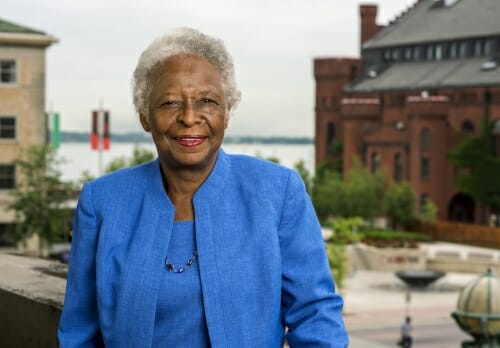Cora Marrett to lead fall Wisconsin Idea course, public lecture series
Cora Marrett, a distinguished sociologist, former deputy director of the National Science Foundation and UW–Madison alumna, will lead this year’s offering of a university course and public lecture series celebrating the Wisconsin Idea.
Inspired by university President Charles Van Hise’s famous statement – “I shall never be content until the beneficent influences of the university reaches every family of the state,” – the idea has become a fundamental part of the University of Wisconsin System, demonstrating not only a philosophy but a tradition of university outreach efforts that extend beyond the Badger state.

Cora Marrett Paul Newby
The course, “Forward? The Wisconsin Idea, Past and Present,” explores how knowledge generated by the university has benefited the public for more than a century and will continue to do so for decades to come.
Though designed for undergraduate students, the course is also open to the public and in previous years has drawn a broad community audience; in this way it aims to foster an ongoing conversation among students, staff, faculty, and the citizens of the state. Attendees can choose between a one-credit, lectures-only option and a three-credit, lectures plus course option.
“From its initiation in 2016, the course has centered on the university in service to the public. This has remained the core of the Wisconsin Idea, although the Idea has been expressed and acted on in various ways over the years,” Marrett says. “At times the emphasis has been on the university and improvement in governance. At other times, on expanding the bases of resources or ensuring educational opportunities for all. Whatever the particular focus, the unifying thread has been the deployment of knowledge in the public interest.”
Marrett holds a bachelor’s degree from Virginia Union University and a master’s degree and a doctorate from UW–Madison, all in sociology. Marrett was a faculty member at UW–Madison from 1974-97, with appointments in the departments of sociology and Afro-American Studies. From 2001-07, Marrett was the University of Wisconsin System’s senior vice president for academic affairs. In 2012, she was recognized by the Wisconsin Alumni Association with a Distinguished Alumni Award. In 2017, UW–Madison awarded Marrett an honorary degree for a career of extraordinary accomplishment.
This year’s course will focus on the forging of democracy and building of relationships, trust, and common understanding across the populace.
“The Idea potentially has links to democracy, by broadening and deepening social connection among citizens,” Marrett says. “This vision of the Idea has been explored less frequently.”
Among the questions to be examined:
- How, and through what efforts, has the Wisconsin Idea sought to promote collective activity – a sense of “we-ness” in the population?
- What examples in the building of collective identity can be drawn from outreach and service initiatives?
- What interpretations have been given of who constitutes the public? What conditions help explain differences in such interpretations?
- What conditions help explain changes in interpretations of and actions surrounding the Wisconsin Idea?
- What challenges, questions, issues stand out, if the Wisconsin Idea is to be advanced for the twenty-first century and beyond?
Featured guest speakers this fall include Harry Brighouse (Philosophy), Katherine Cramer (political science), Dean Diana Hess (education), Doug Maynard (sociology), Thomas O’Guinn (business), Evan Polman (business), Jeff Snowbarger (UW–Stevens Point) and Ross Tangedal (UW–Stevens Point), Jake Vander Zanden (biology), J. David Hoeveler (UW–Milwaukee), Benny Witkovsky (sociology), and Steve Ventura (agriculture).
The course, which university staff member Patrick Brenzel conceived in 2015, is housed in the Department of Sociology and designates a new instructor each year. Past leaders include O’Guinn; Associate Professor Eric Sandgren of the School of Veterinary Medicine and Professor Chad Alan Goldberg of the Department of Sociology.
“I am impressed by the dedication of the team that has overseen the course in prior years, the excellence of the lectures that various people had given, and the sense of a strong interest in ensuring continued deliberation on and pursuit of the Wisconsin Idea,” Marrett says.
The Wisconsin Idea has evolved since 1905 with people bringing their own ingenuity and interpretation. Marrett’s own concept has widened after conversations with colleagues.
“The broadened understanding has been motivating, for it suggests that the Wisconsin Idea is not a finished product,” Marrett says. “Rather, it is a vision to be revisited and revised to be realized as the public context changes.”
For enrollment information, please contact Sociology Undergraduate Program Coordinator Ted Babcock at socugrad@ssc.wisc.edu or (608) 262-3261.
To join the conversation, visit the course website or Facebook page. If you are live tweeting lectures, please use the hashtag #wiscidea.
Subscribe to Wisconsin Ideas
Want more stories of the Wisconsin Idea in action? Sign-up for our monthly e-newsletter highlighting how Badgers are taking their education and research beyond the boundaries of the classroom to improve lives.
